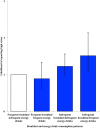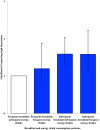Breakfast and Energy Drink Consumption in Secondary School Children: Breakfast Omission, in Isolation or in Combination with Frequent Energy Drink Use, is Associated with Stress, Anxiety, and Depression Cross-Sectionally, but not at 6-Month Follow-Up
- PMID: 26903914
- PMCID: PMC4746319
- DOI: 10.3389/fpsyg.2016.00106
Breakfast and Energy Drink Consumption in Secondary School Children: Breakfast Omission, in Isolation or in Combination with Frequent Energy Drink Use, is Associated with Stress, Anxiety, and Depression Cross-Sectionally, but not at 6-Month Follow-Up
Abstract
A considerable amount of research suggests that breakfast omission and the frequent use of caffeinated energy drinks may be associated with undesirable effects, and particularly so in children and adolescents. The current paper presents cross-sectional and longitudinal data from the Cornish Academies Project to investigate the effects of consuming energy drinks and missing breakfast on stress, anxiety, and depression in a cohort of secondary school children from the South West of England. Questionnaires were administered at two time-points (spaced 6 months apart) to collect information relating to diet and lifestyle over the previous 6 months. Demographic and school data were acquired through the School Information Management System, and single-item measures of stress, anxiety, and depression were administered at the second time-point only. Associations between breakfast and energy drink consumption and stress, anxiety, and depression were investigated, and a multivariate approach was taken so that additional variance from diet, demography, and lifestyle could be controlled for statistically. Cross-sectional analyses showed that breakfast omission was consistently associated with negative outcomes, and that this was largely observed for both those who frequently consumed energy drinks and those who did not. However, cross-lag analyses showed that neither breakfast omission or energy drink consumption, alone or in combination, was predictive of stress, anxiety, or depression at 6-month follow-up. This suggests that associations between breakfast and mental health may be bi-directional rather than breakfast being the causal factor.
Keywords: adolescent behavior; anxiety; breakfast; caffeine; depression; energy drinks; mental health; stress.
Figures



Similar articles
-
Energy drinks, caffeine, junk food, breakfast, depression and academic attainment of secondary school students.J Psychopharmacol. 2018 Aug;32(8):893-899. doi: 10.1177/0269881118783314. Epub 2018 Jun 27. J Psychopharmacol. 2018. PMID: 29947575
-
Association between energy drink intake, sleep, stress, and suicidality in Korean adolescents: energy drink use in isolation or in combination with junk food consumption.Nutr J. 2016 Oct 13;15(1):87. doi: 10.1186/s12937-016-0204-7. Nutr J. 2016. PMID: 27737671 Free PMC article.
-
Caffeine consumption and self-assessed stress, anxiety, and depression in secondary school children.J Psychopharmacol. 2015 Dec;29(12):1236-47. doi: 10.1177/0269881115612404. Epub 2015 Oct 27. J Psychopharmacol. 2015. PMID: 26508718 Free PMC article.
-
A Review of Energy Drinks and Mental Health, with a Focus on Stress, Anxiety, and Depression.J Caffeine Res. 2016 Jun 1;6(2):49-63. doi: 10.1089/jcr.2015.0033. J Caffeine Res. 2016. PMID: 27274415 Free PMC article. Review.
-
Energy drink consumption is associated with unhealthy dietary behaviours among college youth.Perspect Public Health. 2015 Nov;135(6):316-21. doi: 10.1177/1757913914565388. Epub 2015 Feb 9. Perspect Public Health. 2015. PMID: 25667166 Review.
Cited by
-
The Association Between Skipping Breakfast and Anxiety and Depression in Adolescents-A Scoping Review.Children (Basel). 2025 Jul 19;12(7):953. doi: 10.3390/children12070953. Children (Basel). 2025. PMID: 40723146 Free PMC article. Review.
-
Breakfast skipping alone and in interaction with inflammatory based quality of diet increases the risk of higher scores of psychological problems profile in a large sample of Iranian adults.J Nutr Sci. 2021 Feb 16;10:e10. doi: 10.1017/jns.2020.62. eCollection 2021. J Nutr Sci. 2021. PMID: 33889393 Free PMC article.
-
Prevalence of energy drink consumption and association with dietary habits among governmental university students in Riyadh.Saudi J Biol Sci. 2021 Aug;28(8):4511-4515. doi: 10.1016/j.sjbs.2021.04.050. Epub 2021 Apr 24. Saudi J Biol Sci. 2021. PMID: 34354437 Free PMC article.
-
Effects of eating breakfast on children and adolescents: A systematic review of potentially relevant outcomes in economic evaluations.Food Nutr Res. 2019 Sep 12;63. doi: 10.29219/fnr.v63.1618. eCollection 2019. Food Nutr Res. 2019. PMID: 31548838 Free PMC article. Review.
-
Relationship between psychological distress and the adherence to the Korean healthy eating index (KHEI): the Korea National Health and Nutrition Examination Survey (KNHANES) 2013 and 2015.Nutr Res Pract. 2021 Aug;15(4):516-527. doi: 10.4162/nrp.2021.15.4.516. Epub 2020 Nov 27. Nutr Res Pract. 2021. PMID: 34349884 Free PMC article.
References
-
- Benton D., Parker P. Y. (1998). Breakfast, blood glucose, and cognition. Am. J. Clin. Nutr. 67 772S–778S. - PubMed
-
- Bro R. T., Shank L., Williams R., McLaughlin T. F. (1994). The effects of an in-class breakfast program on attendance and on-task behavior of high school students. Child Fam. Behav. Ther. 16 1–8. 10.1300/j019v16n03_01 - DOI
LinkOut - more resources
Full Text Sources
Other Literature Sources

